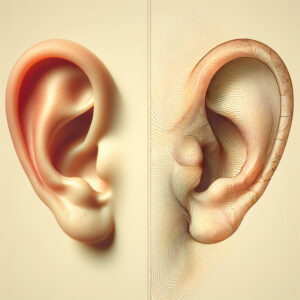How to Support a Loved One with Functional Deafness
How to Support a Loved One with Functional Deafness Understanding Functional Deafness Definition and Overview of Functional Deafness Functional deafness, also known as non-organic hearing loss, is a condition where an individual exhibits hearing loss without any detectable physiological or anatomical cause. This type of hearing impairment is often linked to psychological factors rather than… Read More
Presbycusis of Both Ears: What You Need to Know
Introduction to Presbycusis of Both Ears Definition of Presbycusis Presbycusis, commonly known as age-related hearing loss, affects both ears and is a gradual decline in hearing ability that occurs as people age. It’s one of the most common conditions affecting older adults. This type of hearing loss typically impacts high-frequency sounds first, making it challenging… Read More
The Future of Hidden Hearing Loss Treatment: Cutting-Edge Techniques
Introduction to Hidden Hearing Loss Definition and Symptoms Hidden hearing loss is a type of hearing impairment that affects the ability to hear in noisy environments, despite having normal hearing test results. Unlike traditional hearing loss, which affects the ear’s ability to detect sounds, hidden hearing loss impacts the brain’s ability to process sound, particularly… Read More
Top Treatments for Tinnitus and Muffled Hearing
Understanding Tinnitus and Muffled Hearing What is Tinnitus? Tinnitus is a condition characterized by the perception of noise or ringing in the ears when no external sound is present. This phantom noise can vary in pitch and may be heard in one or both ears. For some, it manifests as a high-pitched ringing, while others… Read More
Preventing Hearing Loss in Lyme Disease Patients: Tips and Strategies
Introduction to Lyme Disease and Hearing Loss Overview of Lyme Disease Lyme disease is a bacterial infection primarily transmitted through the bite of infected black-legged ticks. It is most common in regions with dense woodlands and high grasslands. The disease is caused by the Borrelia burgdorferi bacterium and can lead to a range of symptoms,… Read More
Common and Rare Kinds of Hearing Loss: Diagnosis and Solutions
Understanding the Different Kinds of Hearing Loss Overview of Hearing Loss Hearing loss is a prevalent condition affecting millions worldwide. It can significantly impact one’s quality of life, communication abilities, and overall well-being. Understanding the different kinds of hearing loss is crucial for effective diagnosis and treatment. Hearing loss can be broadly categorized into common… Read More
High Frequency Hearing Loss NHS: Symptoms, Causes, and Solutions
Introduction to High Frequency Hearing Loss NHS Definition and Overview High frequency hearing loss refers to a condition where individuals have difficulty hearing sounds in the higher frequency range, typically above 2000 Hz. This form of hearing loss can significantly affect one’s ability to comprehend speech, especially consonant sounds, which are crucial for understanding conversation…. Read More
From Ear Infections to Aging: The Most Common Cause of Deafness
Introduction to Hearing Disorders Hearing disorders, ranging from mild hearing loss to complete deafness, affect millions of people worldwide. Understanding the different causes and types of hearing loss is crucial for effective management and treatment. Hearing loss can result from various factors, including infections, genetic predispositions, noise exposure, aging, diseases, medications, and traumatic injuries. Early… Read More
AAFP’s Approach to Diagnosing and Managing Hearing Loss
Introduction to AAFP’s Role in Hearing Loss The American Academy of Family Physicians (AAFP) plays a pivotal role in the early detection and management of hearing loss. This esteemed organization focuses on enhancing the quality of healthcare through evidence-based practices and patient-centered care. Hearing loss, a condition affecting millions globally, requires timely intervention to prevent… Read More
Is Being Slightly Deaf in One Ear Affecting Your Life? Discover Solutions
Understanding Being Slightly Deaf in One Ear What Does It Mean to Be Slightly Deaf in One Ear? Being slightly deaf in one ear, also known as unilateral hearing loss, means that an individual experiences reduced hearing ability in just one ear while the other ear functions normally. This condition can vary in severity, but… Read More
The Role of Acoustic Trauma Audiograms in Hearing Loss Prevention
Introduction to Acoustic Trauma and Hearing Loss Acoustic trauma, a form of hearing damage, occurs when the ear is exposed to loud noises or sudden sound bursts. It can lead to temporary or permanent hearing loss, depending on the intensity and duration of the noise exposure. Common causes include loud music, industrial noise, explosions, and… Read More
How Hypertension and Hearing Loss Are Connected: What You Need to Know
Introduction to Hypertension and Hearing Loss Definition of Hypertension: Hypertension, commonly known as high blood pressure, is a medical condition where the force of blood against the artery walls is consistently too high. It can lead to severe health complications if left unmanaged. Overview of Hearing Loss: Hearing loss is the partial or total inability… Read More
Neck Pain and Hearing Loss: A Comprehensive Guide for Patients
Understanding the Connection Between Neck Pain and Hearing Loss Anatomy of the Neck and Ear The neck and ear are intricately connected through a network of nerves, muscles, and blood vessels. The cervical spine, located in the neck, supports the skull and protects the spinal cord. The ear, responsible for hearing and balance, is divided… Read More
The Connection Between Sensorineural Hearing Loss and Tinnitus Explained
Introduction to Sensorineural Hearing Loss and Tinnitus Understanding hearing disorders is crucial for anyone experiencing auditory issues. Sensorineural hearing loss (SNHL) and tinnitus are two conditions that often occur together, impacting daily life and overall well-being. Sensorineural hearing loss refers to damage to the inner ear or the nerve pathways, while tinnitus is characterized by… Read More
How to Manage Bilateral Mild Sensorineural Hearing Loss Effectively
Introduction to Bilateral Mild Sensorineural Hearing Loss Definition and Overview Bilateral mild sensorineural hearing loss refers to a gradual reduction in hearing capability in both ears. This type of hearing loss is typically due to damage to the inner ear or auditory nerve. Though mild, it can affect your ability to understand speech, especially in… Read More
















